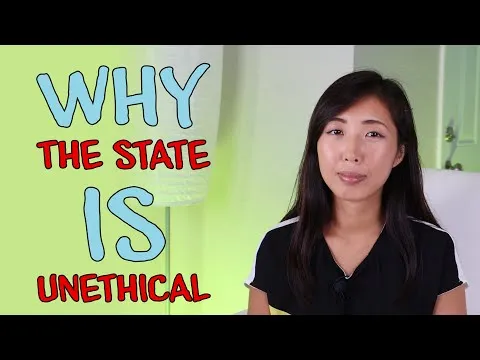I go over why the state is unethical.
Catch behind-the-scenes posts and help choose my next video topic at:
Patreon: https://www.patreon.com/thepholosopher
SubscribeStar: https://www.subscribestar.com/the-pholosopher
Why the State is Unethical
Why the state is unethical comes down to thinking about what you have the ethical right to do as an individual.
Most people readily agree that it is unethical for others to hit them, take from them, or use their property without their consent.
In fact, the idea of everyone wanting their consent to be respected is a logical construct because it is impossible to want one’s consent violated.
The act of wanting something to happen is itself the consent.
Thinking along these lines, no one wishes to have their body touched without their consent.
No one wishes for their food to be eaten without their consent.
No one wishes for damage to be done to their property without their consent.
So, if consent is a universal attribute of human behavior that cannot be wished to be violated in the abstract, it makes sense to use the framing of consent as the predicate for peaceful human interactions.
The nature of the state violates this base norm of consent because those in the state do not get individual consent to rule.
Historically, kings and queens ruled by decree and force.
They did not, individually, ask each living person whether or not they wished to be ruled.
The same can be said for all modern democracies and democratic republics.
Not a single existing state structure stems from individual consent obtained from all persons.
Rather, as is most common, a small group of people claimed a right to all pre-existing lands and bodies in an area and took a vote of limited persons to rationalize their violent conquest of lands they did not themselves capture, clear, and homestead.
This is especially clear with governments that have existed for multiple generations, where those living today have no connection with the founding of the government and had no material say in their being ruled.
Rulers claiming to own people’s body and labor by virtue of birth within some arbitrary region is no more ethical than an alleged right of a master to slave child’s labor born on a plantation.
A slave master cannot ethically own another human being simply because the slave master provided food and housing for the enslaved family in the same manner that a self-proclaimed ruler cannot claim to own the descendants of those born in an arbitrary region.
And this ethical reciprocity is readily understood at the individual level.
Few people would claim to be able to own everyone’s home in an area because they wrote down words on a piece of paper.
Few would actually agree that, if 10 of their neighbors voted together, their neighbors could ethically indebt them and their property with a majority vote.
As you can see when thinking about how you want to be treated, voting does not itself rationalize theft and murder simply because a majority of people agreed to it.
So, if you as an individual cannot take your neighbor’s home, even if you vote on it with 10, 100, or 1,000 others, how can you delegate a right you do not have to the government?
In short- you cannot. If it is unethical for you to steal, murder, or force labor onto others at the threat of deadly force, you cannot delegate those abilities to “the state.”
Which is precisely why things like taxation, conscription, and war, as implemented by the state, are inherently unethical.
Robbery, kidnapping, and murder are still that, even when done with fancy flags, pins, and parades following.
Any reference to Hobbesian ideas of “social contract” to suggest people do consent must be dismissed as an obfuscation of reality.
The concept of “social contract” has no concrete meaning outside of what those already in political power dictate because their definition never relied on individual consent in the first place.
How can one form a contract when the terms were set by the deceased?
How can one’s consent be gained when the terms are forced whether people agree with the terms or not?
Simply, they cannot.
And any suggestion otherwise is a lie and distortion of what it means to gain individual consent.
And, finally, the idea that a person can “always leave” is another obfuscation of reality.
Governments exist around the world and monopolize their power for control.
As they did not gain their power through consent, but through unilateral decrees, pillaging, and force, it is unethical to put the onus on the victim.
On top of that, governments charge people a fee to give up citizenship, so the idea of being able to freely leave is itself predicated on paying out a form of indentured servitude fee, only to face the continued threats of government.
So next time someone tells you that you consented to being ruled, remind them of the fact that government was instituted against pre-existing people and lands no matter who consented to the rule.
People cannot consent to something they never had a chance to opt out of in the first place.
🖤 💛 🖤 💛 🖤 💛 🖤 💛
#freemarket #voluntaryism #libertarian #anarchy #ancap #endthefed

